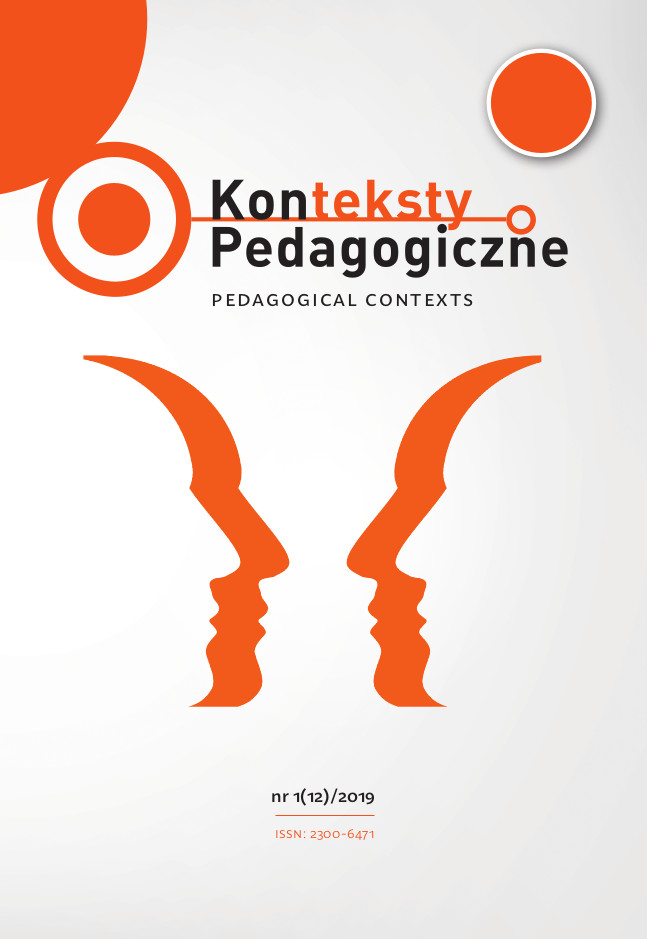Abstrakt
Apart from practical and mental autonomy, the social self-reliance of preschool children constitutes an important aspect of an individual’s attaining independence and school maturity. According to the author, contemporary children sometimes present an insufficient level of social self-reliance, which may hinder them from taking actions and implementing future life roles, especially that of a student, as well as from developing independence and a sense of success. In consequence, this may contribute to lower self-esteem and difficulties in the social functioning of the child. The author supplements theoretical considerations with the results of her own research conducted in preschool education institutions in the Opole region in 2018. An analysis of 530 questionnaires from the observation of five and six-year-old children indicated that most of them attained social self-reliance in the studied areas. There were, however, also children who scored low or very low in the area and who require particular support on their way towards self-reliance. The children had the best results in their engagement and perseverance while performing jobs for others, and the poorest – in the sphere of taking decisions or co-deciding.
Bibliografia
Andrzejewska, J. (2013). Zróżnicowanie modeli edukacyjnych w przedszkolu a funkcjonowanie psychospołeczne dzieci [Diversification of Educational Models in Kindergarten and Psychosocial Functioning of Children]. Lublin: Wydawnictwo Marii Curie-Skłodowskiej.
Andrzejewska, J. (2015). Doświadczanie przez dziecko samodzielności [The Child’s Experience of Autonomy]. Przedszkolne ABC. Magazyn dla Wychowawców i Rodziców, 7, 4–10.
Dubisz, S. (ed.). (2003). Uniwersalny słownik języka polskiego [The Universal Dictionary of the Polish Language]. Warszawa: PWN.
Dudzińska, B. (2002). Samodzielność zdobywana w szkole [Self-reliance Gained at School]. Nauczyciel i Szkoła, 1–2, 152–157.
Guz, S. (1987). Rozwój i kształtowanie osobowości dzieci w wieku wczesnoszkolnym [Development and Shaping of Child’s Personality at the Preschool Age]. Warszawa: WSiP.
Jędrzejowska, E. (2017) Samodzielność dzieci w wieku przedszkolnym [Self-reliance of Pre-school Children]. Pedagogika Przedszkolna i Wczesnoszkolna, 2(10), 355–366.
Karbowniczek, J. (2015). Samodzielność dziecka i jego naturalność w odkrywaniu świata źródłem wewnętrznej motywacji do nauki oraz szansą osiągania sukcesu w świetle koncepcji inteligencji sprzyjającej powodzeniu życiowemu R. Sternberga [The child’s independence and simplicity in discovering the world as a source of intrinsic motivation to learn and a chance to succeed in the light of the concept of successful intelligence by R. Sternberg]. Edukacja Elementarna, 37, 159–166.
Kulas, H. (1998). Rozwój poczucia kontroli u dzieci w wieku szkolnym [Developing a Sense of Control in Schoolchildren]. Psychologia Wychowawcza, 3, 219–230.
Kuszak, K. (2002). Postawa samodzielności dziecka przedszkolnego jako wynik przejmowania zachowań (cz. I II) [The Self-reliant Attitude of a Pre-school Child as a Result of Behavioral Adoption (Part I and II)]. Wychowanie na co Dzień, 2–3, 4–5, 24–26, 29–34.
Kuszak, K. (2006a). Dynamika rozwoju samodzielności dziecka w wieku przedszkolnym [Dynamics of Self-reliance Development of a Pre-school Child]. Poznań: Wydawnictwo WAM.
Kuszak, K. (2006b). Formy samodzielności dzieci [Forms of Child Autonomy]. Wychowanie w Przedszkolu, 4, 9–13.
Lipowska, I. (2013). Jak uczyć dziecko samodzielności w rozwiązywaniu problemów [How to Teach a Child to Be Independent in Problem Solving]. Bliżej Przedszkola, 1, 16–17.
Olczak, A. (2010). Obraz ucznia w wypowiedziach przyszłych nauczycieli edukacji wczesnoszkolnej [The Image of a Pupil According to the Future Early Childhood Education Teachers]. In: M. Kowalski, A. Pawlak and A. Famuła-Jurczak (eds.), Przestrzeń edukacyjna – dylematy, doświadczenia i oczekiwania społeczne [Educational Space – Dilemmas, Experiences and Social Expectations] (pp. 189–199). Kraków: Oficyna Wydawnicza “Impuls.”
Schaffer, H.R. (2005). Psychologia dziecka [Introducing Child Psychology], transl. A. Wojciechowski. Warszawa: PWN.
Skibska, J. (2018). Słowo wstępne [A Word of Introduction]. Konteksty Pedagogiczne, 1(10), 25–36.
Waloszek, D. (2006). Pedagogika przedszkolna. Metamorfoza statusu i przedmiotu badań [Pre-school Pedagogy. Metamorphosis of the Status and Research Subject]. Kraków: Wydawnictwo Naukowe Akademii Pedagogicznej.
Żmudzka, M. (1995). Samodzielność jako czynnik kształtowania umiejętności uczenia się uczniów klas początkowych [Self-reliance as a Factor in the Shaping of Learning Skills of Initial Classes Students]. Zeszyty Naukowe Wyższej Szkoły Pedagogicznej w Bydgoszczy. Studia Pedagogiczne, 20, 41–49.
Autor zgodnie z zaleceniem MNiSW, by przeciwdziałać praktykom „ghostwriting” i „guest authorship” składając tekst dołącza oświadczenie Autora/Autorów, w którym deklaruje wkład każdego z Autorów w powstawanie publikacji. Własnoręcznie podpisane oświadczenie należy przesłać na adres redakcji:
Joanna Skibska | w formie skanu przesłać poprzez system OJS (biblioteka wydawcy).
Autorzy nie ponoszą żadnych kosztów w związku z publikacją artykułu na łamach czasopisma Konteksty Pedagogiczne oraz nie otrzymują gratyfikacji finansowej za opublikowanie tekstu. Redakcja zastrzega sobie prawo do wprowadzania niewielkich zmian w artykułach, które nie mają wpływu na merytoryczną stronę publikacji.
Autor (Autorzy) artykułu oświadcza, że przesłane opracowanie nie narusza praw autorskich osób trzecich. Wyraża zgodę na poddanie artykułu procedurze recenzji oraz dokonanie zmian redakcyjnych. Przenosi nieodpłatnie na Wydawnictwo Libron autorskie prawa majątkowe do utworu na polach eksploatacji wymienionych w art. 50 Ustawy z dnia 4 lutego 1994 r. o prawie autorskim i prawach pokrewnych – pod warunkiem, że praca została zaakceptowana do publikacji i opublikowana.
Wydawnictwo Libron posiada autorskie prawa majątkowe do wszystkich treści czasopisma. Zamieszczenie tekstu artykuły w repozytorium, na stronie domowej autora lub na innej stronie jest dozwolone o ile nie wiąże się z pozyskiwaniem korzyści majątkowych, a tekst wyposażony będzie w informacje źródłowe (w tym również tytuł, rok, numer i adres internetowy czasopisma).
Tekst jest udostępniany w internecie na licencji CC-BY-SA

